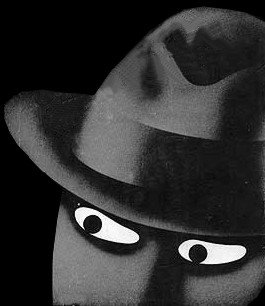
Clarksburg author fueled America’s 1950s fascination with flying saucers
By Tricia Fulks
Charleston Daily Mail
7-13-08
CLARKSBURG — The late Gray Barker inspired the “Men in Black” movie.By Tricia Fulks
Charleston Daily Mail
7-13-08
The popular author from Clarksburg wrote extensively about the Flatwoods Monster, Mothman and other weird subjects.
In one magazine article after another, Barker helped to fuel America’s fascination with flying saucers in the 1950s.
But that’s not all.
“I found that there was more to this guy than UFOs,” said Bob Wilkinson, a notable West Virginia filmmaker who’s now producing a documentary on Barker. “He’s a complex character.”
As for the documentary, “It’s a West Virginia product, so I’m pretty proud of that,” Wilkinson said.
Barker was born in the tiny hamlet of Riffle in Braxton County in 1925. He went to nearby Glenville State College and got his degree in teaching.
He taught for a while in Maryland but then came home to West Virginia where he booked films and managed theaters in the Clarksburg area.
“He would find these films that Marilyn Monroe was in as an extra, and he would acquire them for the drive-ins and advertise them as Marilyn Monroe double features,” said David Houchin, special collections librarian at the Clarksburg-Harrison Public Library, which has a room dedicated to the life and works of Barker. It is crammed with books, articles and manuscripts.
“Maybe he was the type of person who could fool you and you never resented it,” Houchin said.
And fooling is exactly what Barker specialized in.
In 1952, Barker went to Braxton County to investigate the infamous Flatwoods Monster.
Residents claimed to have seen a glowing object fly across the sky, and went to the woods where it landed.
They said they saw a creature with glowing red eyes that smelled like something they’ve never smelled before.
Barker’s report about the strange beast was published in “Fate” magazine.
Houchin said this represented Barker’s “entry into the field of paranormal.”
That’s when Barker began asking around in earnest and writing about extraterrestrials and UFOs.
Houchin said Barker was really fooling his audience. He said Barker himself didn’t believe in these conspiracies, but would simply write about it and pass it off as fact.
Houchin said Barker was “not profoundly committed to the limits of fact,” so he was essentially writing science fiction.
This is the type of writing Barker did until he died in 1984 at the age of 59 in a Charleston hospital.
Throughout his career he published his own UFO newsletter in Clarksburg and wrote multiple books. His most-recognized book was his first one, “They Knew Too Much About Flying Saucers.”
In that book, a central element was friend and fellow writer Albert Bender.
Bender was the editor of “Space Review,” a UFO periodical for which Barker was a correspondent.
In the last issue of “Space Review,” the newsletter’s overall theme was that the mystery of UFOs was no longer a mystery.
It was reported that Bender was visited by three men in black suits who had threatened him.
This story gave Barker the opportunity to poke fun at the situation, writing that extraterrestrials were actually the “men in black,” which was the basis of his final book, “MIB: The Secret Terror Among Us.” This became the inspiration for the hit 1997 movie.
Barker was published in many different newsletters, including his own called “The Saucerian.” He also investigated the Mothman creature in Point Pleasant, which resulted in his book “The Silver Bridge.”
But besides his career as a writer, Barker was living another life that was quite controversial at the time.
Houchin said there was a reason Barker left teaching in Maryland. He said he was most likely blackballed for being a homosexual.
“Either he hated teaching, or he was forced out,” Houchin said.
Houchin said Barker was a “smart guy in a pretty uncomfortable situation.”
“He was leading the life of a clandestine gay man in Clarksburg, W.Va., in the ’50s and ’60s,” Houchin said. “Barker was reasonably accepted. Nothing serious happened.”
But despite a few run-ins with the law and his reputation around town, Barker was very well known locally for his writing.
“He was that guy that came to your school and talked to you about flying saucers,” Houchin said.
Houchin said too much alcohol consumption for too long probably contributed to his death, though many suspected he had AIDS.
“It’s hard to say,” Houchin said. “We don’t know.”
Houchin said Barker was never a serious UFO researcher, but was more a “folklorist” who would hear other people’s stories and publish them.
“Barker was frankly lying to people about UFOs,” Houchin said.
But he added, “Barker’s contribution to popular culture is significant.”

No comments :
Post a Comment
Dear Reader/Contributor,
Your input is greatly appreciated, and coveted; however, blatant mis-use of this site's bandwidth will not be tolerated (e.g., SPAM, non-related links, etc).
Additionally, healthy debate is invited; however, ad hominem and or vitriolic attacks will not be published, nor will "anonymous" criticisms. Please keep your arguments/comments to the issues and subject matter of this article and present them with civility and proper decorum. -FW